- >Platforms
- >CARFI
CARdiovascular Function In vitro
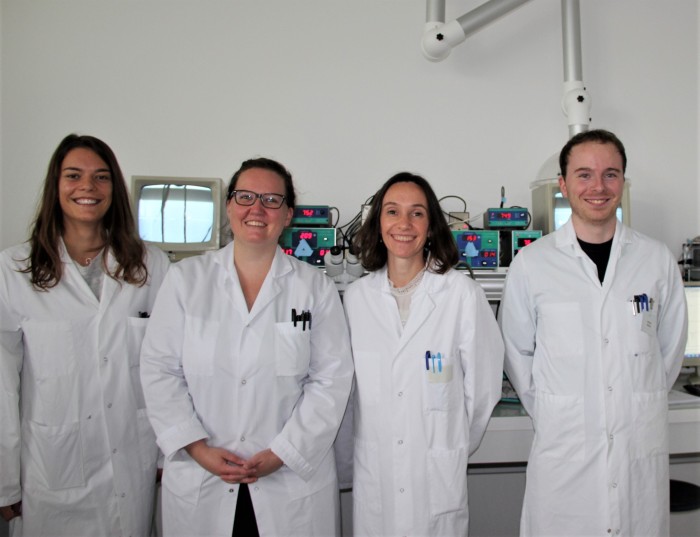
CARFI is a technical platform dedicated to the study of the small resistance arteries functions based on the expertise of the researchers, engineers and technicians of the Laboratory.
CARFI supplies a panel of techniques for the exploration of resistance arteries reactivity in vivo, ex vivo and in vitro.
CARFI provides its expertise as service or collaboration.
CARFI also offers training courses (theorical and practical) to students, technicians and researchers for the use of the equipment dedicated to the study of resistance arteries.
Analysis of vascular functions and structure:
in small animal (mice and rat) models of human diseases
in human small blood vessels including inclusion of tissues and data in the local tissue bank (CRB)
Analysis of vascular functions and structure of whole organs such as the kidney including analysis of the effuent (ELISA / cytokines, NOx measurements…etc)
CARFI is recognized by his peers as an expert platform for ex vivo experiments, in particular for the very small arteries.
Ex vivo experiments
A group of eight pressure-arteriographs and six four-channel wire myographs is dedicated to the in vitro study of endothelial and muscular functions of isolated arteries. This facility is open to all members of the laboratory and to other laboratory in France and abroad. Vascular reactivity is measured on vascular samples (from aorta to resistance arteries 100µm wide such as mesenteric or cerebral resistance arteries).
Pressure myograph (LSI, Burlington, VT) to study :
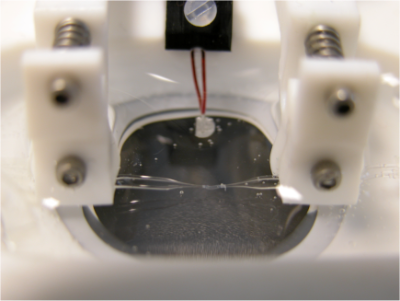
- Flow mediated dilation
- Myogenic tone
- Remodeling parameters
- Electro stimulation
Six-channel wire myographs (Danish Myotech, DK) used to measure wall force in rings of vascular samples as small as 200 microns in diameter
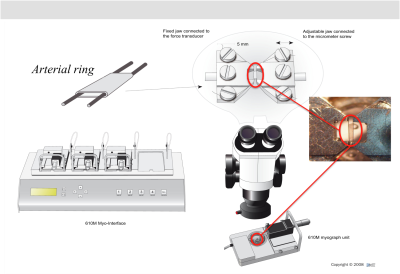
- Vascular smooth muscle function
- Vascular endothelium function
- Length-tension relationship
- Wall tension & morphometric measurements
- Assessment of pharmacological reactivity and electrical field stimulation
Organ bath
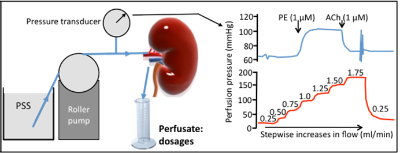
Pressure-flow relationship and assessment of pharmacology on isolated and perfused kidney and on isolated and perfused mesenteric bed.
In vivo experiments
Vascular reactivity is investigated after in vivo measurement of the main cardiovascular parameters (blood pressure using tail cuff or telemetry, local blood flow using Transonic probes).
In vivo study are available using the following technology:
Tail cuff blood pressure measurement: rats and mice (DSI)
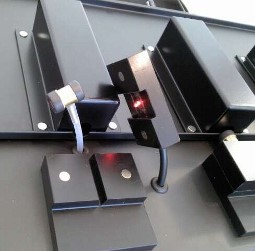
This method allows the measurement of blood pressure on vigil animals, slightly constrained. This non-invasive method does not require the use of anesthetics and allows repeating measurements (daily, weekly, monthly…).
Telemetry: for rats and mice (DSI)
Telemetry allows measuring parameters such as systolic and diastolic pressure or heart rate on awake, mobile animals in their cage through a lead implanted subcutaneously. This technology allows evaluating several physiological signals without disturbing the animal and over a period of a few days to several months.
Flow meter
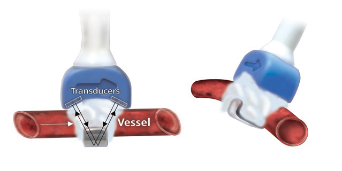
Transonic for arterial blood flow measurements in arteries in vivo (Emka) is the method of reference for blood flow measurement on anesthetized animal.
Arterial catheterisation
Technique for invasing monitoring blood pressure.
In vitro experiments
CARFI can also provide samples from the animal which can then be analyzed by biochemical, histological, cellular or molecular methods available either in the laboratory or outside.
Contact
Lead scientist : Daniel Henrion - daniel.henrion @ univ-angers.fr
Technical manager : Emilie Roy Vessieres - emilie.vessieres @ univ-angers.fr


